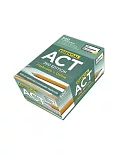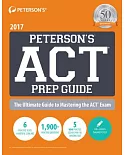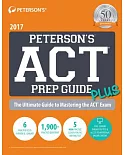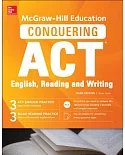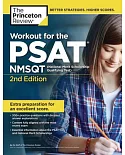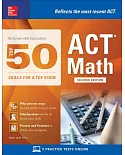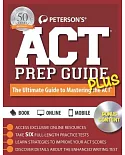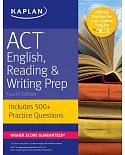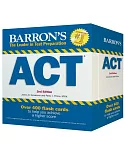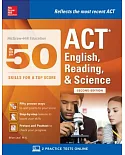Master the ACT and get into the college you want... Our ACT test experts show you the right way to prepare for this important test and score higher. REA's new and fully expanded 5th edition
examines all ACT assessment subject areas including in-depth coverage of the ACT's new Writing Test. The comprehensive review covers every possible exam topic: Reading, English, Math, and
Science. Features 5 full-length practice exams. Each practice exam question is fully explained to help you better understand the subject material. Use the book's appendix and index for speedy
look-ups and smarter searches.
Follow up your study with REA's proven test-taking strategies, powerhouse drills and study schedule that get you ready to master the ACT.
DETAILS
- Comprehensive review of every subject to appear on the ACT assessment: Reading, Math, English, and Science
- Contains the ACT's latest change - the all-new Writing Test
- Dynamic diagnostic exam pinpoints your exam strengths and weaknesses
- Flexible study schedule tailored to your needs
- Packed with proven test tips, strategies and advice to help you master the ACT
- 5 full-length practice ACT assessment exams. Each exam question is answered in complete detail with easy-to-follow, easy-to-grasp explanations.
- Fully indexed for quicker and smarter searches.
- Bonus College Guide on how to choose your college wisely
TABLE OF CONTENTS
ACT INDEPENDENT STUDY SCHEDULE
Chapter 1: SCORING HIGH ON THE ACT ASSESSMENT
About Our Book
About the ACT
How to Use this Book
Format of the ACT
About the Review Sections
Scoring the ACT
Scoring Worksheet
Raw Score Conversion Chart
Subscore Conversion Chart: Raw Score to Scaled Score
Studying for the ACT
Test-Taking Tips
The Day of the Exam
Chapter 2: CHOOSING A COLLEGE
How Do I Find College Information?
Types of Institutions
What Am I Looking for in a College?
What Do Colleges Look for?
Visiting Colleges
Athletics
How to Apply
Chapter 3: ACT ASSESSMENT DIAGNOSTIC EXAM
ACT Assessment Diagnostic Exam
Answer Key
Detailed Explanations of Answers
Chapter 4: ATTACKING THE ACT ENGLISH TEST
Description of the ACT English Test
About the Directions
Strategies for the English Section
Skills Tested
Standard Written English Review
Rhetorical Skills Review
Answer Key for Drills
Chapter 5: ATTACKING THE ACT MATHEMATICS TEST
Description of the ACT Mathematics Test
About the Directions
Strategies for the Mathematics Section
Skills Tested
Arithmetic Review
Algebra Review
Geometry and Trigonometry Review
Answer Key for Drills
Chapter 6: ATTACKING THE ACT READING TEST
Description of the ACT Reading Test
About the Directions
Strategies for the Reading Section
Skills Tested
Reading Review
Answer Key for Drill
Chapter 7: ATTACKING THE ACT SCIENCE REASONING TEST
Description of the ACT Science Reasoning Test
About the Directions
Strategies for the Science Reasoning Section
Skills Tested
Sample Passages and Questions
Biology Review
Chemistry Review
Physics Review
Earth Science Review
Geology Review
Astronomy Review
Meteorology Review
Answer Key for Drills
PRACTICE EXAM I
Answer Key
Detailed Explanations of Answers
PRACTICE EXAM II
Answer Key
Detailed Explanations of Answers
PRACTICE EXAM III
Answer Key
Detailed Explanations of Answers
PRACTICE EXAM IV
Answer Key
Detailed Explanations of Answers
ANSWER SHEETS (WITH SUBSCORE-AREA CODING)
ATTACKING THE ACT WRITING TEST
APPENDIX
INDEX
EXCERPT
About Research & Education Association
Research & Education Association (REA) is an organization of educators, scientists, and engineers specializing in various academic fields. Founded in 1959 with the purpose of
disseminating the most recently developed scientific information to groups in industry, government, high schools, and universities, REA has since become a successful and highly respected
publisher of study aids, test preps, handbooks, and reference works.
REA's Test Preparation series includes study guides for all academic levels in almost all disciplines. Research & Education Association publishes test preps for students who have not yet
completed high school, as well as high school students preparing to enter college. Students from countries around the world seeking to attend college in the United States will find the
assistance they need in REA's publications. For college students seeking advanced degrees, REA publishes test preps for many major graduate school admission examinations in a wide variety of
disciplines, including engineering, law, and medicine. Students at every level, in every field, with every ambition can find what they are looking for among REA's publications.
While most test preparation books present practice tests that bear little resemblance to the actual exams, REA's series presents tests that accurately depict the official exams in both degree
of difficulty and types of questions. REA's practice tests are always based upon the most recently administered exams, and include every type of question that can be expected on the actual
exams.
REA's publications and educational materials are highly regarded and continually receive an unprecedented amount of praise from professionals, instructors, librarians, parents, and students.
Our authors are as diverse as the fields represented in the books we publish. They are well-known in their respective disciplines and serve on the faculties of prestigious high schools,
colleges, and universities throughout the United States and Canada.
Chapter 1: SCORING HIGH ON THE ACT ASSESSMENT
ABOUT OUR BOOK
This book has the tools to effectively prepare you for the ACT Assessment. It contains five full-length practice exams complete with answer keys and detailed explanations for each question,
along with a topical review for each of the four individual tests that make up the ACT. All of the practice exams we provide are based on the latest ACT test administrations and contain every
type of question that you can expect to encounter on the actual exam.
ABOUT THE ACT
Who Takes the ACT and What is It Used for?
The ACT is usually taken by high school juniors and seniors. The exam is used by college admissions officers as a way to fairly judge all the students who apply to their school. Because high
schools across the United States use many different grading systems, ACT scores put everyone on more of an equal footing. Your ACT scores, along with other information provided by you and
your high school, help colleges predict how well you will do at the college level.
If you don't do well on the ACT, don't panic! The exam can be taken over so that you can work on improving your scores. It's also not the be-all and end-all that you might think it is.
Admissions officers use a number of criteria to judge applicants: Grade-point average, extracurricular activities, on-campus interviews, and the degree to which you've been taking challenging
courses in high school are all factors that go into the mix. REA believes you have every reason to believe that, with enough of the right preparation, you can and should score well on the
ACT. Nonetheless, you shouldn't think that not doing so will necessarily jeopardize your chances of attending the college of your choice. The very fact that you picked up this book, however,
means that you're not one to leave much to chance. Having our test prep at your side as you approach test day will give you the extra shot of confidence we all sometimes need to climb the
ladder of success.
Who Administers the ACT?
The ACT is developed and administered by ACT, Inc., and involves the assistance of educators throughout the country. The development process is designed and implemented to ensure that the
content and difficulty level of the exam are appropriate.
When and Where is the ACT Given?
You should try to take the exam early in your junior or senior year so that you will have another opportunity to take it if you are not satisfied with your performance. Taking our practice
exams will familiarize you with the types of questions and format of the ACT so that you do not have to go through the anxiety of learning about the ACT during the actual exam.
The ACT is usually administered five times a year throughout the country. It is given at hundreds of locations, including high schools. The usual testing day is Saturday, but the exam can be
taken on an alternate day if a conflict, such as a religious obligation, exists.
To receive information on upcoming administrations of the ACT, consult the ACT Registration Bulletin, which can be obtained from your guidance counselor, or contact ACT, Inc., directly
at:
ACT Registration
Phone: (319) 337-1270 (Weekdays 8 a.m. to 8 p.m. ct)
Website: http://www.act.org
Online registration or registration by phone is recommended
To take the ACT, you must pay a registration fee. A fee waiver may be granted in certain situations. To find out if you qualify, ask your guidance counselor.
HOW TO USE THIS BOOK
What Do I Study First?
Begin your studies by first taking our written diagnostic exam. The tables that follow include an answer key to score your exam, and also explain what review material you need to study if you
answer a question incorrectly.
After taking the written diagnostic exam, you may wish to continue your study by moving on to our Practice Exams I and II. Or, if you prefer, first study our reviews, which are designed to
provide you with the information and strategies you need to do well on the ACT.
Complete your preparation by taking the remaining two practice exams. For the most benefit, be sure to simulate actual testing conditions. Sit at a table in a quiet room and be sure to time
yourself. Doing so will help you become familiar with the format and procedures involved with taking the actual ACT, and should help alleviate some of your test-taking anxiety.
To best utilize your study time, follow our ACT Independent Study Schedule, which you'll find in the front of this book. The schedule is based on a ten-week program, but can be condensed to
five weeks if necessary.
When Should I Start Studying?
It is never too early to start studying for the ACT. The earlier you begin, the more time you will have to sharpen your skills. Do not procrastinate! Cramming is not an effective way to
study, since it does not allow you the time needed to learn the exam material. The sooner you learn the format of the exam, the more time you will have to familiarize yourself with it.
FORMAT OF THE ACT ASSESSMENT
English - 45 minutes - 75 questions
Usage/Mechanics
- Punctuation 13% 10 multiple-choice
- Basic Grammar & Usage 16% 12 multiple-choice
- Sentence Structure 24% 18 multiple-choice
Rhetorical Skills
- Strategy 16% 12 multiple-choice
- Organization 15% 11 multiple-choice
- Style 16% 12 multiple-choice
Mathematics 60 minutes - 60 questions
Pre-Algebra / Elem. Algebra
- Pre-Algebra 23% 14 multiple-choice
- Elementary Algebra 17% 10 multiple-choice
Int. Algebra / Coord. Geometry
- Intermediate Algebra 15% 9 multiple-choice
- Coordinate Geometry 15% 9 multiple-choice
Plane Geometry / Trigonometry
- Plane Geometry 23% 14 multiple-choice
- Trigonometry 7% 4 multiple-choice
Reading - 35 minutes - 40 questions
Social Studies/Sciences
- Social Studies 25% 10 multiple-choice
- Natural Sciences 25% 10 multiple-choice
Arts/Literature
- Prose Fiction 25% 10 multiple-choice
- Humanities 25% 10 multiple-choice
Science Reasoning - 35 minutes - 40 questions
- Data Representation 38% 15 multiple-choice
- Research Summaries 45% 18 multiple-choice
- Conflicting Viewpoints 17% 7 multiple-choice
The breakdown of questions may appear as follows:
Test 1: English - 5 passages each followed by 15 questions (45 minutes)
Test 2: Mathematics - 60 regular math questions (60 minutes)
Test 3: Reading - 4 reading passages with 10 questions on each passage (35 minutes)
Test 4: Science Reasoning - 7 passages each followed by between 5 & 7 questions (35 minutes)
Note: On certain test dates, a fifth test is administered for developmental purposes. This test will not be counted toward your score.
Total questions: 215
Total Testing Time: 2 hours, 55 minutes
All of the questions on the ACT are in multiple-choice format and provide four answer choices, except those in the Mathematics test which present five choices.
English Test
There are two types of English questions on the ACT, for which you will receive separate subscores:
- Usage/Mechanics: (40 questions) You will be required to review sentences from the passages for proper grammar. These questions test your knowledge of punctuation, your understanding
of basic grammar and usage, and your recognition of proper sentence structure.
- Rhetorical Skills: (35 questions) You will be tested on your ability to recognize the strategy of a piece of writing, and to choose expressions and sentences which will support that
strategy. Your skill level in organizing ideas and judging statements in context will also be tested. Finally, your ability to select precise and appropriate words and images, avoid ambiguous
or ineffective writing, and write economically will be tested.
Mathematics Test
In the Mathematics test, you will encounter standard multiple-choice questions. The test covers five areas, but you will receive three subscores based on the following topics:
- Pre-Algebra/Elementary Algebra: (24 questions) These questions test your knowledge of whole numbers, decimals, integers, fractions, linear equations, algebraic equations, and your
ability to solve a quadratic equation.
- Intermediate Algebra and Coordinate Geometry: (18 questions) You will be tested on graphing in the coordinate plane, operations with integer exponents, radical and rational
expressions, the quadratic formula, linear inequalities in one variable, and systems of two linear equations in two variables.
- Plane Geometry/Trigonometry: (18 questions) These questions evaluate your knowledge of the properties and relations of figures on the geometric plane, right triangle trigonometry,
graphing trigonometric functions, and basic trigonometric identities.
Reading Test
The Reading passages cover topics in social studies, the natural sciences, prose fiction, and the humanities. You will receive two subscores based on the following areas:
- Social Studies/Natural Sciences: (20 questions) The Social Studies questions will evaluate you on a passage that may come from history, political science, anthropology, psychology,
or sociology. The Natural Science questions will test you on a passage from biology, chemistry, physics, or the physical sciences.
- Arts/Literature: (20 questions) Questions on the Arts will be based on a passage covering art, music, philosophy, theater, architecture, or dance. The Literature questions will
evaluate you based on a passage that is a complete short story, or an excerpt from a short story or novel.
Science Reasoning Test
The Science Reasoning test has seven passages, which are taken from the fields of biology, chemistry, physics, and the physical sciences (this includes astronomy, geology, and meteorology).
Rather than test your recall of scientific content, or your skill in mathematics or reading, these questions seek to evaluate your ability to reason scientifically. The information will be
conveyed in one of three formats:
- Data Representation: (15 questions) These questions ask you to read tables, graphs, or scatter plots. Your ability to read and interpret information presented in this format will be
measured.
- Research Summaries: (18 questions) You will be presented with descriptions of one or more related experiments. Questions in this format will focus on experimental design and ask you
to interpret the experimental results.
- Conflicting Viewpoints: (7 questions) These questions will be based on a reading passage that presents several hypotheses or views that are inconsistent with each other. You will be
asked to understand, analyze, and compare these conflicting viewpoints or hypotheses.
ABOUT THE REVIEW SECTIONS
The reviews in this book are designed to help you sharpen the basic skills needed to approach the ACT as well as provide strategies for attacking each type of question. A separate review is
presented for each ACT test: English, Mathematics, Reading, and Science Reasoning. Drills are provided to reinforce what you have learned. By using the reviews in conjunction with the
practice tests, you will better prepare yourself for the actual exam.
SCORING THE ACT
When Will I Receive My Score Report and What Will It Look Like?
You will receive your ACT score report four to eight weeks after you take the test. Aside from you, only your high school, the colleges you indicated on your answer sheet, and scholarship
services will see your scores.
Your score report will contain your scaled scores for each of the four tests, and your composite score. Your subscores for the English, Mathematics, and Reading tests will also be noted. As
mentioned, they are scored independently, and will not necessarily add up to the scaled score for each test. For example, the three Mathematics subscores will not necessarily add up to your
scaled score in Mathematics. The score report will also denote percentiles for each scaled score, subscore, and your composite score. This information tells you the number of students who
took the same administration of the ACT and received scores equivalent to or lower than yours. Your composite score will also be ranked with those of enrolled first-year students at the
colleges you indicated on your answer sheet.
STUDYING FOR THE ACT
It is very important to choose the time and place for studying that works best for you. Some students may set aside a certain number of hours every morning, while others may choose to study
at night before going to sleep. Other students may study during the day, while waiting on line, or even while eating lunch. Only you can determine when and where your study time will be the
most effective. But be consistent and use your time wisely. Work out a study routine and stick to it!
When you take our written practice exams, try to make your testing conditions as much like the actual exam as possible. Turn your television and radio off, and sit down at a quiet table free
from distraction. Make sure to time yourself. Start off by setting a timer for the time that is allotted for each test, and be sure to reset the timer for the appropriate amount of time when
you start a new test.
As you complete each diagnostic and practice exam, score your exam and thoroughly review the explanations to the questions you answered incorrectly; however, do not review too much at one
time. Concentrate on one problem area at a time by reviewing the question and explanation, and by studying our review until you are confident that you completely understand the
material.
Since you will be allowed to write in your test booklet during the actual ACT, you may want to write in the margins and spaces of this book while practicing; however, do not make
miscellaneous notes on your answer sheets. Mark each answer clearly and make sure the answer you have chosen corresponds to the question you are answering.
Score your exams using the Scoring Worksheet and keep track of them. By doing so, you will be able to gauge your progress and discover general weaknesses in particular sections. You should
carefully study the reviews that cover your areas of difficulty, as this will build your skills in those areas.
TEST-TAKING TIPS
Although you may not be familiar with standardized exams such as the ACT, there are many ways to acquaint yourself with this type of examination and help alleviate your test-taking anxieties.
Listed below are ways to help you become accustomed to the ACT, some of which may be applied to other standardized tests as well.
Become comfortable with the format of the ACT. When you are practicing, simulate the conditions under which you will be taking the actual exam. Stay calm and pace yourself. After
simulating the exam a couple of times, you will boost your chances of doing well, and you will be able to sit down for the actual ACT with much more confidence.
Read all of the possible answers. Just because you think you have found the correct response, do not automatically assume that it is the best answer. Read through each choice to be
sure that you are not making a mistake by jumping to conclusions.
Use the process of elimination. Go through each answer to a question and eliminate as many of the answer choices as possible. By eliminating two answer choices, you have given yourself
a better chance of getting the item correct since there will only be two or three choices left from which to make your guess. Guess only if you can eliminate at least two answers.
Be careful if you use a calculator. Calculators are now permitted on the mathematics portion of the test. However, all the questions can be solved without the use of a calculator. Use
your judgment on when and where you should use a calculator. You may find that some questions are more easily solved without the use of a calculator. A good rule of thumb is to use a
calculator only if you use it regularly in your classwork and homework. You should note that not all types of calculators are permitted. Unacceptable calculators include handheld or laptop
computers, electronic writing pads or pen-input devices, pocket organizers, models with typewriter-style keypads, noisy or paper tape calculators, and calculators that require a power cord.
You should make sure your calculator has fresh batteries and remember that sharing of calculators is prohibited.
Answer every question. You are not penalized if you answer a question incorrectly. Try to use the guessing strategy even if you are truly stumped by a question, since there is still a
possibility you will select the correct answer.
Work quickly and steadily. You will have only 35 to 60 minutes to work on each test, so avoid focusing on any one problem too long. Take our practice exams to help you learn to budget
your precious time.
Learn the directions and format for each test. Familiarizing yourself with the directions and format of the different tests will not only save time, but will also help you avoid
nervousness (and the mistakes caused by getting nervous).
Work the easier questions first. If you find yourself working too long on one question, make a mark next to it in your test booklet and come back to it. After you have answered all the
questions that you can, go back to the ones you have skipped.
Be sure that the answer oval you are marking corresponds to the number of the question in the test booklet. Since the tests are graded by machine, marking one wrong answer can throw
off your answer key and score. Be extremely careful.
Eliminate the obviously wrong answers. Sometimes an ACT question will have one or two answer choices that are a little odd. These answers will stick out as being wrong for one of
several reasons: they may be impossible given the conditions of the problem, they may violate mathematical rules or principles, or they may be illogical. Being able to spot answers that are
clearly wrong before you finish a problem gives you an advantage because you will be able to make a more educated guess from the remaining choices if you are unable to fully solve the
problem.
Work from the answer choices. One of the ways you can use a multiple-choice format to your advantage is to work backwards from the answer choices to solve a problem. This is not a
strategy you can use all of the time, but it can be helpful if you can just plug the choices into a given formula or equation. The answer choices can often narrow the scope of the responses.
You may be able to make an educated guess based on eliminating choices that you know do not fit into the problem.
THE DAY OF THE EXAM
Before the Exam
On the day of the exam, you should wake up early and have a good breakfast. Make sure to dress comfortably, so that you are not distracted by being too hot or too cold while taking the test.
Also plan to arrive at the test center early. This will allow you to collect your thoughts and relax before the exam, and will also spare you the anguish that comes with being late. As an
added incentive to make sure you arrive early, keep in mind that no one will be allowed into the test session after the test has begun.
Before you leave for the test center, make sure that you have your admission ticket and another form of identification, which must contain a recent photograph, your name, and signature (i.e.,
passport, driver's license, recently published photo, or a letter of identification from your school with photo attached). Check with your guidance counselor or ACT Administration if you have
any questions about proper identification, since you will not be allowed in the test center without it. You must also bring several sharpened No. 2 pencils with erasers, as none will be
provided at the test center.
If you would like, wear a watch to the test center. However, you may not wear one that has an alarm, as it may disturb other test-takers. No dictionaries, textbooks, notebooks, briefcases, or
packages will be permitted and drinking, smoking, and eating are prohibited. Only your pencils and admission ticket will be permitted into the testing area.
During the Exam
Once you enter the test center, follow all of the rules and instructions given by the test supervisor. If you do not, you risk being dismissed from the test and having your ACT scores
canceled. When all of the exam materials have been passed out, the test supervisor will give you directions for filling out your answer sheet. You must fill out this answer sheet carefully.
Fill out your name exactly as it appears on your identification documents and admission ticket, unless otherwise instructed.
Remember that you can write in your test booklet, as no scratch paper will be provided. Mark your answers in the appropriate spaces on the answer sheet. Each numbered row will contain four or
five ovals corresponding to each answer choice for that question. Fill in the oval which corresponds to your answer darkly, completely, and in a neat manner. You can change you answer, but
remember to completely erase your old answer. Only one answer should be marked. As your answer sheet will be machine-scored, stray lines or marks may cause the machine to score your answers
incorrectly.
After the Exam
Once your exam materials have been collected, you will be dismissed. Your score report should be mailed out in four to eight weeks.


